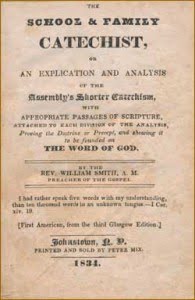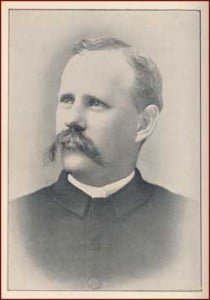Attempt to Bind the Conscience Sadly Successful
I suppose it was a solemn scene in man’s eyes when the Special Judicial Commission of the Presbytery of West* Jersey met on September 10, 1935. But in God’s eyes, surely God’s Spirit was grieved when this judicatory met to bind the conscience of a minister of the Lord Jesus for the sole reason that he had disobeyed a mandate of the General Assembly regarding his membership in an Independent Board for Presbyterian Foreign Missions. And yet that was the censure of this presbytery regarding the pastor of the Collingswood Presbyterian Church, namely, the Rev Carl McIntire.
*[Thanks to our friend Walt for this correction: There was no “Presbytery of New Jersey” in the PCUSA. The PCUSA jurisdiction that tried Dr. McIntire was the Presbytery of West Jersey, named for the old colonial providence, whose capital was Burlington.]
There had been six charges against this minister. But aided by his counsel consisting of Hon. James E Bennet and the Rev. H. McAllister Griffiths, Carl McIntire was acquitted of three of them. They were: rebellion against the brethren in the church in lawful counsels, commands, and correction; conduct unbecoming a minister; and advocating rebellion against the constituted authorities in the church. In these three, he was declared “Not Guilty.”
However, in three others, he was convicted as guilty. They were: disapproval, defiance, and acts in contravention of the government and discipline of the church; not being zealous and faithful in maintaining the peace of the church; and violation of his ordination vows.
We have to remind ourselves again that Carl McIntire’s error, as was J. Gresham Machen’s, and others was that they dared to organize an Independent Board for Presbyterian Foreign Missions which believed in sending out only Bible-believing missionaries of the cross. Further, that they dared to obey God rather than man, in disobeying the Mandate of the General Assembly in 1934 to cease their participation in and support for said Independent Board.
But the proverbial die was cast. Carl McIntire was suspended from the ministry of the Presbyterian Church, U.S.A. until he resigned from that Independent Board and gave evidence of repentance to the Presbytery of West Jersey. If appeal was made to this ruling, then they would suspend their judgment though they held to their authority to not do so.The appeal of their decision was made on September 19, 1935 to the General Assembly.
It is interesting that one member of the Commission, Hon. Samuel Irebell, disagreed from the judgment, stating that the weight of the evidence presented was on the defendant’s side and not on the Commission’s side.
Words to live by: What was going on here in the New Jersey Presbytery was occurring all over the land with the members of and supporters for the Independent Board of Presbyterian Foreign Missions. When one stands up for the Word of God against unbelief, unbelieving man will try to squash your testimony. If he cannot do that, then you may suffer expulsion from the visible church. But be faithful to God, His Word, the Great Commission, and the Reformed Faith, and He will honor you at the last, if not here, then certainly hereafter in heaven.


